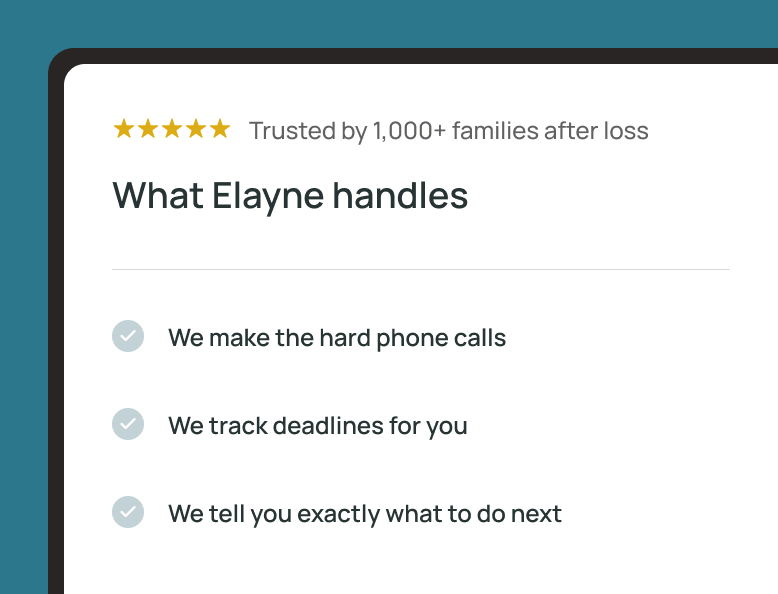Key Takeaways
- Driving a deceased person’s vehicle without proper legal authority can be illegal.
- You may need court documents, insurance updates, and a title transfer before driving or selling the car.
- Each state has specific laws on how long you can drive or retain a deceased person's vehicle.
{{blog-cta-admin}}
After the loss of a loved one, families often face emotional and logistical challenges—especially when it comes to handling personal property. One of the most common questions that arises is: Can you drive a deceased person’s car? And if so, how long can you drive a deceased person’s car before it becomes a legal problem?
While it might seem harmless to use the vehicle temporarily, perhaps to keep it in working order or handle errands, the reality is more complex. Driving a deceased person’s car without proper authorization can lead to legal, financial, and insurance issues. If you have authority to act, here are key points to consider.
Can You Drive a Deceased Person’s Car?
When someone passes away, their property, including vehicles, becomes part of their estate. That means no one automatically owns or can use the car until the estate is properly settled or an executor is officially recognized.
The legal authority to make decisions about the car typically rests with:
- The named executor in the will.
- A court-appointed administrator if there’s no will.
- In limited cases, a surviving spouse or co-owner.
Until that authority is established, driving a deceased person’s vehicle could be considered unauthorized use. It’s also risky because the vehicle’s registration and insurance are tied to the deceased’s name. If either lapses, the car technically cannot be legally driven on public roads.
Is It Illegal to Drive a Deceased Person’s Car?
In most cases, yes, it is illegal to drive a deceased person’s car unless you have explicit permission or authority. Legal use might be permitted if:
- You are the executor or administrator of the estate.
- The insurance policy covers other drivers after the policyholder’s death.
- Your state’s DMV allows short-term use under estate administration.
If you drive without meeting these conditions, you could face:
- Traffic tickets or fines for unregistered use.
- Insurance claim denial if an accident occurs.
- Personal liability for any damages or injuries caused.
Even well-meaning family members could unintentionally violate the law by driving the car.
How Long Can You Drive a Deceased Person’s Car?
The answer depends largely on your state’s probate laws and how quickly ownership can be transferred. Some states allow limited use (typically 30–60 days) if the driver is an executor and can show proof of estate administration. Others prohibit any use until the title and insurance are updated.
If the vehicle’s registration or insurance expires during probate, the car should remain parked until both are renewed in the estate’s or executor’s name.
What Happens If You Drive a Deceased Person’s Car Without Authorization?
If you drive without authorization, several legal and financial consequences may follow:
- Registration and Insurance Violations: The car may no longer be legally registered or insured.
- Accident Liability: The insurance company could deny coverage, leaving you personally responsible for damages.
- Estate Complications: Unauthorized use can delay the probate process or cause disputes among beneficiaries.
Even if no accident occurs, law enforcement could impound the vehicle or issue fines if ownership status is unclear.
Driving a Deceased Person’s Vehicle: When Is It Allowed?
You can generally drive the car if you are the executor or administrator of the estate and have:
- The death certificate.
- Letters Testamentary or proof of executorship.
- Updated insurance listing you or the estate as an insured party.
- Notification to the Department of Motor Vehicles (DMV).
In some states, a surviving spouse or co-owner may continue driving temporarily if their name appears on the title or policy. Always confirm this with your local DMV or attorney before driving.
Selling a Vehicle from a Deceased Estate
If you’re managing or settling the estate, selling the vehicle requires a few legal steps:
- Locate the title and will. Confirm who has authority over the car.
- Obtain probate approval or a small estate affidavit, depending on your state.
- Transfer the title into the buyer’s name through the DMV.
- Settle any liens or taxes associated with the car.
It’s important to note that you usually cannot sell or trade in the vehicle until ownership has been legally transferred. Until then, the car should remain parked and secured.
Tips for Managing the Vehicle After Death
- Don’t drive it until you confirm legal authority or insurance coverage.
- Contact the insurance company right away to report the policyholder’s death.
- Notify the DMV and begin the title transfer if you are the executor.
- Store the car safely, either in a garage or legal parking area, to avoid fines or damage.
If the estate is large or involves multiple beneficiaries, it’s best to consult an estate attorney.
Conclusion
Driving a deceased person’s car may seem like a small, practical step during a difficult time, but it can have serious consequences if done without proper authorization. Before starting the engine, confirm your legal standing, update insurance, and work through the estate’s formal process.
Need help managing estate tasks, including vehicle transfers? Visit Elayne’s Automated Estate Settlements platform for guided, step-by-step support.
{{blog-cta-admin}}
FAQs
Q: Can you legally drive a deceased person’s car if you’re a family member?
Only if you’re listed as a co-owner or have been granted legal authority through the estate.
Q: How long can you drive a deceased person’s car before it becomes a legal issue?
Most states require ownership or insurance updates within 30–60 days, but check your local laws.
Q: What happens if you drive a deceased person's car and get into an accident?
You could be held personally liable, and the insurance company may deny coverage.
Q: Is it illegal to drive a deceased person’s car if they gave me permission before they died?
Yes—verbal permission ends upon death. Only legal estate authority allows continued use.
Q: How do I sell a vehicle from a deceased estate?
Obtain probate approval or a small estate affidavit, then complete a title transfer before selling.
*Disclaimer: This article is for informational purposes only and does not provide legal, medical, financial, or tax advice. Please consult with a licensed professional to address your specific situation.












































